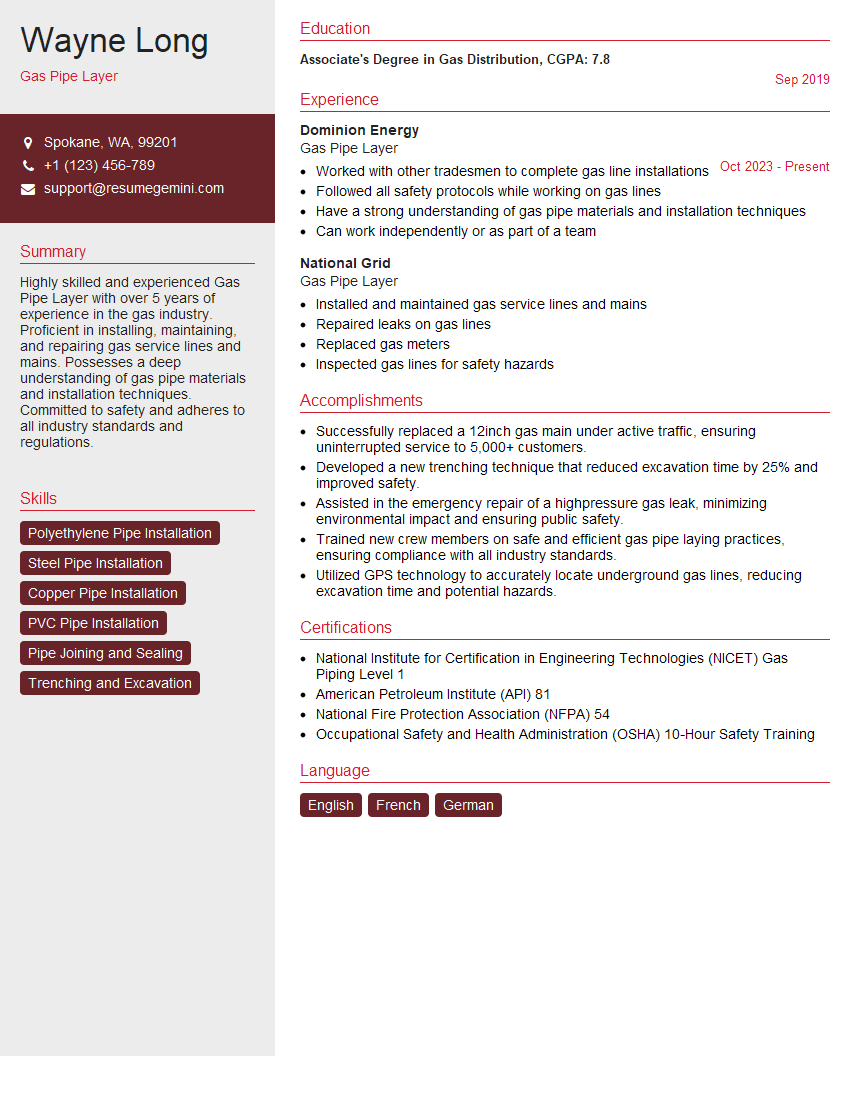Are you a seasoned Gas Pipe Layer seeking a new career path? Discover our professionally built Gas Pipe Layer Resume Template. This time-saving tool provides a solid foundation for your job search. Simply click “Edit Resume” to customize it with your unique experiences and achievements. Customize fonts and colors to match your personal style and increase your chances of landing your dream job. Explore more Resume Templates for additional options.

Wayne Long
Gas Pipe Layer
Summary
Highly skilled and experienced Gas Pipe Layer with over 5 years of experience in the gas industry. Proficient in installing, maintaining, and repairing gas service lines and mains. Possesses a deep understanding of gas pipe materials and installation techniques. Committed to safety and adheres to all industry standards and regulations.
Education
Associate’s Degree in Gas Distribution
September 2019
Skills
- Polyethylene Pipe Installation
- Steel Pipe Installation
- Copper Pipe Installation
- PVC Pipe Installation
- Pipe Joining and Sealing
- Trenching and Excavation
Work Experience
Gas Pipe Layer
- Worked with other tradesmen to complete gas line installations
- Followed all safety protocols while working on gas lines
- Have a strong understanding of gas pipe materials and installation techniques
- Can work independently or as part of a team
Gas Pipe Layer
- Installed and maintained gas service lines and mains
- Repaired leaks on gas lines
- Replaced gas meters
- Inspected gas lines for safety hazards
Accomplishments
- Successfully replaced a 12inch gas main under active traffic, ensuring uninterrupted service to 5,000+ customers.
- Developed a new trenching technique that reduced excavation time by 25% and improved safety.
- Assisted in the emergency repair of a highpressure gas leak, minimizing environmental impact and ensuring public safety.
- Trained new crew members on safe and efficient gas pipe laying practices, ensuring compliance with all industry standards.
- Utilized GPS technology to accurately locate underground gas lines, reducing excavation time and potential hazards.
Certificates
- National Institute for Certification in Engineering Technologies (NICET) Gas Piping Level 1
- American Petroleum Institute (API) 81
- National Fire Protection Association (NFPA) 54
- Occupational Safety and Health Administration (OSHA) 10-Hour Safety Training
Languages
- English
- French
- German
Career Expert Tips:
- Select the ideal resume template to showcase your professional experience effectively.
- Master the art of resume writing to highlight your unique qualifications and achievements.
- Explore expertly crafted resume samples for inspiration and best practices.
- Build your best resume for free this new year with ResumeGemini. Enjoy exclusive discounts on ATS optimized resume templates.
How To Write Resume For Gas Pipe Layer
- Highlight your experience in installing and repairing various types of gas pipes, including polyethylene, steel, copper, and PVC.
- Quantify your accomplishments whenever possible, using specific metrics to demonstrate your impact.
- Showcase your knowledge of industry standards and regulations, as well as your commitment to safety.
- Emphasize your ability to work independently and as part of a team, adapting to different work environments.
- Consider obtaining certifications or licenses in gas pipe laying to enhance your credibility.
Essential Experience Highlights for a Strong Gas Pipe Layer Resume
- Installed and maintained gas service lines and mains, ensuring safe and efficient gas delivery.
- Repaired leaks on gas lines, minimizing disruptions to customers and preventing potential hazards.
- Replaced gas meters, ensuring accurate billing and optimal performance.
- Inspected gas lines for safety hazards, identifying potential issues and implementing corrective measures.
- Worked collaboratively with other tradesmen to complete gas line installations, ensuring seamless execution.
- Followed all safety protocols while working on gas lines, maintaining a safe working environment.
- Stayed up-to-date on industry best practices and regulations related to gas pipeline installation and maintenance.
Frequently Asked Questions (FAQ’s) For Gas Pipe Layer
What are the primary responsibilities of a Gas Pipe Layer?
Gas Pipe Layers are responsible for installing, maintaining, and repairing gas service lines and mains, ensuring safe and efficient gas delivery to homes and businesses.
What skills are required to be a successful Gas Pipe Layer?
Successful Gas Pipe Layers possess skills in polyethylene pipe installation, steel pipe installation, copper pipe installation, PVC pipe installation, pipe joining and sealing, trenching and excavation.
What is the educational background required to become a Gas Pipe Layer?
While formal education is not always required, many Gas Pipe Layers have an Associate’s Degree in Gas Distribution or a related field.
What safety measures should Gas Pipe Layers follow?
Gas Pipe Layers must adhere to strict safety protocols while working on gas lines, including wearing appropriate safety gear, following proper excavation procedures, and maintaining a safe working environment.
What are the career advancement opportunities for Gas Pipe Layers?
Experienced Gas Pipe Layers can advance to positions such as Gas Service Technician, Gas Distribution Supervisor, or Project Manager.
How can I prepare for a career as a Gas Pipe Layer?
Consider pursuing an Associate’s Degree in Gas Distribution or a related field, gaining hands-on experience through internships or apprenticeships, and obtaining industry certifications to enhance your qualifications.
What is the job outlook for Gas Pipe Layers?
The job outlook for Gas Pipe Layers is expected to grow in the coming years due to increasing demand for natural gas and the need to maintain and expand existing gas infrastructure.